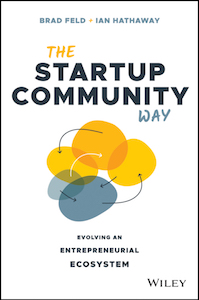The Startup Community Way builds on the previous book Startup Communities. It dives into the world of complex systems and their operations.
It explains why some communities thrive where information, talent and capital flow freely, and social capital or “networks of trust” are plenty. Social capital is based on virtuous and high-trust relationships where quality is more important than quantity, and the results are non-linear and highly impactful.
Do you want to seed a startup community? Richard Florida’s thesis is that the creative class attracts technological innovation and increases employment. Instead of building new incubators how about invest in 200 rock bands? Sounds counter-intuitive but you need to create the right environment in order for the other desired activities to happen. Welcome to complex systems that you can influence but cannot control.
Ideas, talent and funding are key inputs for a startup community. They are served by network and cultural capital that are supporting the entrepreneurial drive. These represent five of the different capital classes based on the Seven Capital framework (i.e. intellectual, human, financial, network, cultural, physical and institutional).
When you focus on improving one aspect in isolation you’re causing changes elsewhere. Often, these are becoming issues and trouble in other parts of the ecosystem. Good intentions can run havoc where a holistic approach is missing. This is especially problematic with feeders who can take decisive action only from their perspective.
Considering startup communities as complex systems instead of just complicated ones opens a new line of thinking. Complicated systems are still predictable, linear and knowable but complex are totally different. Realising this difference helps to be more humble and fine-tune the approach when dealing with an evolutionary and bottom-up type of development.
Adaptive systems are interactive and startup communities are in the ever-evolving state of change and transformation based on the interaction of the participants.
Like in Startup Communities there are several myths that are present. More of everything is a very persistent one. In complicated or simple linear systems inputs are correlated with outputs. More you put in more you can expect to come out. In complex systems, this is not the case.
A single unicorn exit can do more to a startup ecosystem than many years of other activities. Outlier not-very-likely events can have huge impacts that are not statistically predictable, and they can take a long time to show up. Entrepreneurial success reinforces and recycles more success. Often, the wealth from a successful exit ripple around the startup community in various ways from new investments, angels to inspiration and resources. This can supercharge the community to a totally new level.
Healthy startup ecosystems are anti-fragile by their nature. They are resilient, seek a degree of randomness and disruption that inflict crucial learning and evolution. In contrast, bureaucrats and communities that are against change are fragile.
When you let go of the notion that you can control the system (and that it’s just complicated) the interaction becomes more relaxed and meaningful. It’s futile to impose top-down measures to something that works differently.
For this reason, startup communities cannot be replicated either. They are unique. Nobody has managed to xerox Silicon Valley. It’s not possible. Even SV was over a hundred years in making, and the foundations were poured decades earlier than the actual silica started to become a hot item in tech.
The only way to succeed is to focus on becoming a better version of oneself. This empowers the community and puts it to look further ahead and helps to keep things in perspective. Learn from failures and do better. Rinse and repeat. Take risks and don’t get too comfortable or otherwise you’re not taking enough risks and exploring new avenues.
The Rainforest by Victor Hwang and Greg Horowitt gives some explanations and descriptions for successful startup communities. Among the key findings is the fact that the community should be very open to new ideas and people with high networks of implicit trust and social contracts with strong values and leadership combined with social feedback loops and face-to-face interactions. Social interaction needs to be cultivated and embraced. It does not happen by itself. There is a lot of natural friction for people to come together and open up with a supportive mindset.
In summary, the point is to help entrepreneurs succeed and this is at the core of any startup ecosystem. What’s your role and contribution it’s up to you but only by action you can have an impact.

